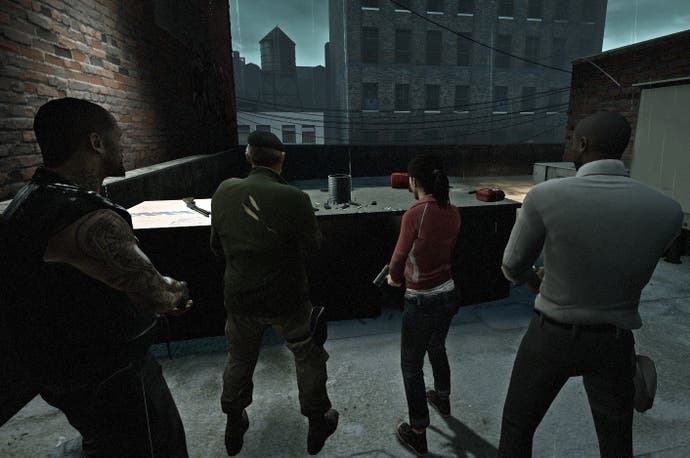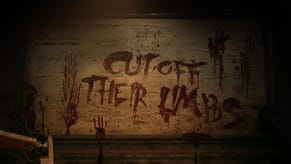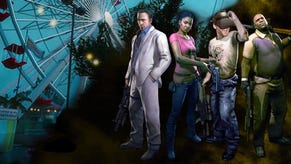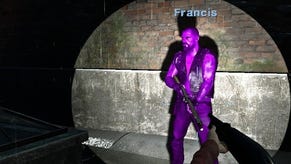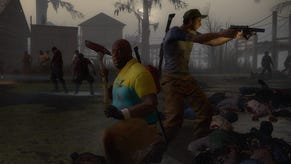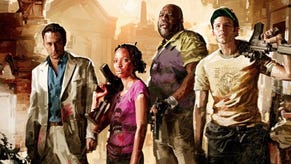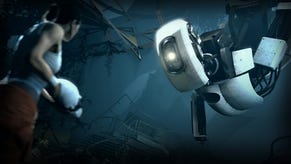How Left4Dead changed my life for the better
A little story about the wonder of a sadly departed games magazine and Valve's excellent co-op shooter.
This is a little story about a magazine that no longer exists, and a game that, for all intents and purposes, no longer exists either.
I didn't grow up wanting to be a games journalist. I grew up wanting to write for PC Zone. This is an important distinction. For most of my adolescence PC Zone was the only source of gaming news and reviews that I read, the likes of Steve Hill, Rhianna Pratchett, Paul Presley, Richie Shoemaker and all the other fantastic writers that magazine employed were the only voices that I trusted. I was stupidly loyal to that glossy paper rectangle. I rubbished PC Gamer without ever reading it (I've since read and written for Gamer. It's a great mag but for goodness sake don't tell anyone I said that). Heck, I even remember the first copy that I bought myself - it had the Nomad Soul on the cover, that bizarre RPG with David Bowie in it.
At the same time, I'd spent a lot of time growing up searching for a truly great cooperative PC game to play with friends. I've written around this subject before, playing Unreal Tournament with my brother and my pals over the LAN in my parent's attic. Yet while Unreal Tournament had its moments, as did games like Operation Flashpoint and mods like Sven Coop, they weren't dedicated, purpose built cooperative games. They involved teamwork, sure, but they didn't quite engender that sense of camaraderie I was looking for.
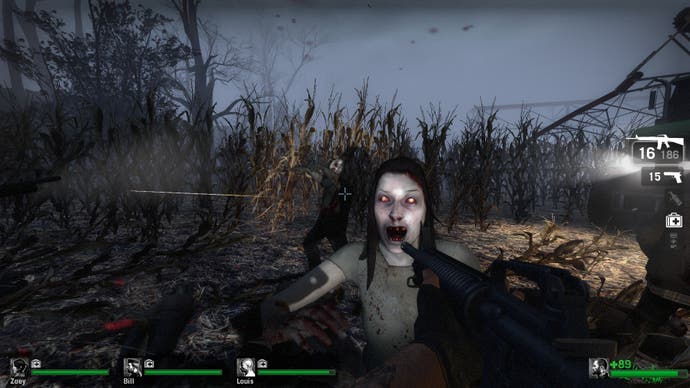
When Left4Dead came out, both these worlds converged. It wasn't even the full game that did it. It was the demo of Left4Dead, the first two stages of the No Mercy campaign, where everything began. The PC Zone crew, who in late 2008 would have been Will Porter, Steve Hogarty, Jon Blyth and David Brown, organised some games with the PCZ readers via the Steam group.
At some point during that period I landed in a game with three of them. Within five minutes of playing that demo I knew Left4Dead was pretty much everything I had been looking for in a cooperative game. They way friendly-fire is always on, encouraging you to acknowledge and respect the space occupied by other players, and using set-pieces like those final mission base defences to encourage you to form a plan and work together, always ensuring you know where the other players are and what they are doing.
Left4Dead brings players together by constantly trying to pull them apart, to pick off stragglers in the group using the tongue of a well-placed Smoker or the claws of a Hunter, or simply by throwing a horde of sprinting, chattering Infected at you at the moment when you're least expecting it. In fact, it's probably that first horde, the sheer number of those pale, exceptionally well-animated bodies charging at you when you realise this is a game you do not want to play alone.
There's a moment that particularly stands out in my mind from that initial session with the Zone writers. In the second stage of the No Mercy campaign, the exit from the saferoom leads immediately to a gaping hole in the floor, which drops into the subway that makes up the majority of that stage. This zombie-strewn chasm proved an impasse for us for a ridiculously long time. Initially we approached it with excessive caution, trying to figure out the best way to navigate it, who to send down first and who to provide cover from above.
All the while the game's AI director is watching silently above us like some malevolent god, and spawns a Smoker to drag one of us into the hole, at which point the plan goes completely out the window and everyone leaps down at once and promptly dies, howling with laughter. Variations upon this theme happened so many times. Someone would fall in by accident and be left to their fate, or we'd all agree to jump down simultaneously, only one person would either accidentally or deliberately ignore the plan, causing torrents of jocular invective from the three players who just got splattered against the wall by an abruptly spawning Tank.
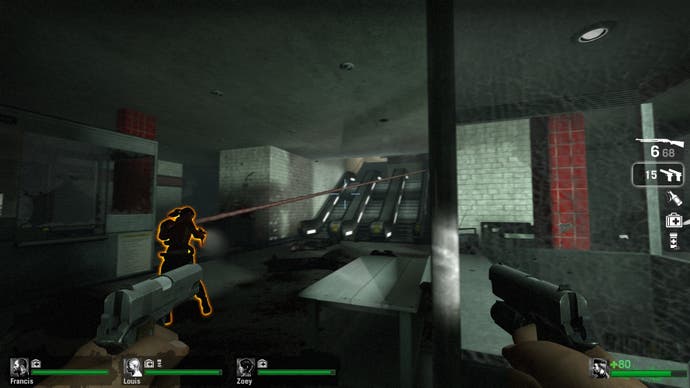
Naturally when the full game came out I immediately threw money at the screen, as did many other folk in and around Zone. It wasn't just the writers who played together, it was the whole community. Readers, forum members, forum members' friends, forum members' friends' pets. Left4Dead brought the PCZone community together in a way that I don't think any other game managed. Many of the people I met through Left4Dead I still communicate with regularly, and a few are fast-friends.
All of this benefited our enjoyment of the game. Someone would pop up on Steam with the message "Dead Air on Expert?" and we'd all pile in for an evening of gaming. Gradually our calamitous shenanigans morphed into speedy reactions and instinctual teamwork, as we all better grasped the game and learned how our friends and acquaintances played. We learned that setting fire to a Tank and then carefully evading it was a much better strategy than frantically blasting it with guns, and that the cupboard in the riverside house that was the setting for the finale of Death Toll became an impenetrable fortress with four automatic shotguns poking out from it (until Valve later removed this exploit, anyway).
As we all desired to finish each Campaign on Expert, it became quite a serious endeavour. We'd approach the game with the discipline of a special-ops team. We discussed our approach beforehand and learned every inch of the magnificently designed levels, clearly imprinted with Valve's craftsmanship in terms of how they flow and evolve. I wish more developers would adopt Valve/Turtle Rock's approach to environment design, dispensing with the attractive but arbitrary skyboxes, and instead considering how environments facilitate the game in a functional sense, how the structure of an apartment block, a farmstead, an airport affects how both players and AI are channelled through those areas, how that 3D space might be advantageous or disadvantageous to the player depending on the angles from which they are approached. Level design, as opposed to environment design, is a skill all of its own, and Left4Dead demonstrates this with aplomb.
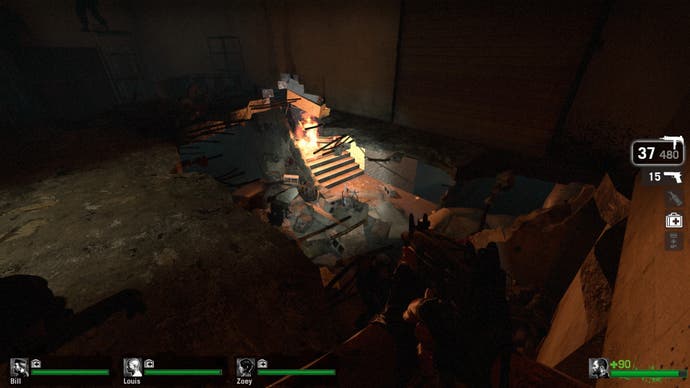
I ended up getting two weeks of work experience at Zone, but soon after - and I like to think this was unrelated - the magazine closed, and that was that. Meanwhile, Left4Dead has seen most of its content ported into the sequel, leaving it a sort of empty husk, which I suppose is a fitting fate for a game about the undead. It's odd to think that these powerful formative influences on my life will probably never be experienced by anyone else now. I'm sure a few hardcore fans still cling on to the original Left4Dead, but otherwise they're done, finished. The road I travelled by is gone.
Still, I suppose things didn't turn out so bad, though I'm yet to play another game that evokes the same cooperative thrills that Left4Dead did, and perhaps given the impact it had upon my life, it's unrealistic to think there will ever be one. Left4Dead is more than an action game to me, more than a set of cleverly designed systems and smartly crafted environments. It brought me closer to a community than I would have ever managed on my own. It led me, albeit briefly, to achieve a lifelong goal. It kind of got me a job. It's still bringing me work right now, as I type these very words. To better that another game would have to make me a millionaire, or bring me the secret of eternal youth (I'm looking at you, Evolve). So thank you, Valve and Turtle Rock, for quite literally changing my life.
